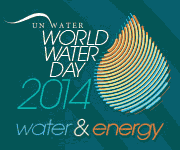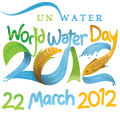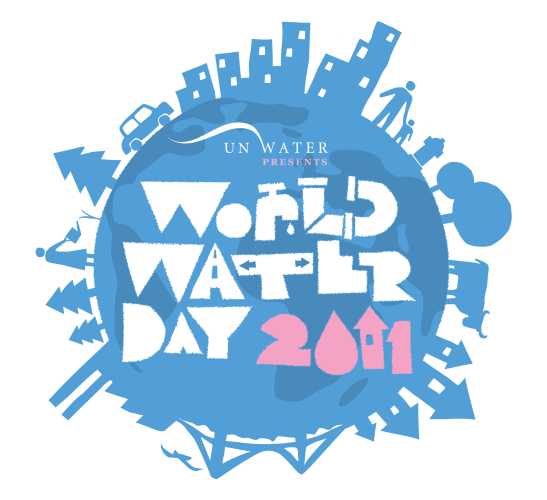
WORLD WATER DAY
World Water Day is held annually on 22 March as a means of focusing attention on the importance of freshwater and advocating for the sustainable management of freshwater resources.
An international day to celebrate freshwater was recommended at the 1992 United Nations Conference on Environment and Development (UNCED). The United Nations General Assembly responded by designating 22 March 1993 as the first World Water Day.
Each year, World Water Day highlights a specific aspect of freshwater. In 2014, World Water Day will be on "Water and Energy". A brief overview of the different themes that have been the focus of World Water Day celebrations is available below.
2015 WATER AND SUSTAINABLE DEVELOPMENT
 2015 is a seminal year with the intergovernmental negotiations on the post-2015 development agenda. Given water’s essential role for development, the focus of the 2015 World Water Day is on ‘Water and Sustainable Development’ with UNDP as the lead coordinator.
2015 is a seminal year with the intergovernmental negotiations on the post-2015 development agenda. Given water’s essential role for development, the focus of the 2015 World Water Day is on ‘Water and Sustainable Development’ with UNDP as the lead coordinator.
“Water is at the core of sustainable development” is a key quote in UN-Water’s ‘Strategy to 2020’. Yet few fully understand what sustainable development means – and if they have a definition, it likely differs from another person’s. This is why World Water Day: The 2015 Campaign will tell the sustainability story around water. It aims to raise awareness and inspire global action. For this to happen, there needs to be strong learning component as sustainability means weaving water into a wide range of issues, from WASH to energy, from food to industry.
Visit website >>
2014 WATER AND ENERGY
 Water and energy are closely interlinked and interdependent. Energy generation and transmission requires utilization of water resources, particularly for hydroelectric, nuclear, and thermal energy sources. Conversely, about 8% of the global energy generation is used for pumping, treating and transporting water to various consumers.
Water and energy are closely interlinked and interdependent. Energy generation and transmission requires utilization of water resources, particularly for hydroelectric, nuclear, and thermal energy sources. Conversely, about 8% of the global energy generation is used for pumping, treating and transporting water to various consumers.
In 2014, the UN System – working closely with its Member States and other relevant stakeholders – is collectively bringing its attention to the water-energy nexus, particularly addressing inequities, especially for the 'bottom billion' who live in slums and impoverished rural areas and survive without access to safe drinking water, adequate sanitation, sufficient food and energy services. It also aims to facilitate the development of policies and crosscutting frameworks that bridge ministries and sectors, leading the way to energy security and sustainable water use in a green economy. Particular attention will be paid to identifying best practices that can make a water- and energy-efficient 'Green Industry' a reality.
Visit website >>
2013 WATER COOPERATION
 In December 2010, the United Nations General Assembly declared 2013 as the United Nations International Year of Water Cooperation. In reflection of this declaration, the 2013 World Water Day, which will take place on 22 March 2013, also will be dedicated to water cooperation. Therefore, UN-Water has called upon UNESCO to lead the 2013 United Nations International Year on Water Cooperation, in particular because of the Organization’s unique multidisciplinary approach which blends the natural and social sciences, education, culture and communication. Given the intrinsic nature of water as a transversal and universal element, the United Nations International Year on Water Cooperation naturally would embrace and touch upon all these aspects.
In December 2010, the United Nations General Assembly declared 2013 as the United Nations International Year of Water Cooperation. In reflection of this declaration, the 2013 World Water Day, which will take place on 22 March 2013, also will be dedicated to water cooperation. Therefore, UN-Water has called upon UNESCO to lead the 2013 United Nations International Year on Water Cooperation, in particular because of the Organization’s unique multidisciplinary approach which blends the natural and social sciences, education, culture and communication. Given the intrinsic nature of water as a transversal and universal element, the United Nations International Year on Water Cooperation naturally would embrace and touch upon all these aspects.
Visit the Water Cooperation 2013 web site >>
2012 WATER AND FOOD SECURITY
 International World Water Day is held annually on 22 March as a means of focusing attention on the importance of freshwater and advocating for the sustainable management of freshwater resources. An international day to celebrate freshwater was recommended at the 1992 United Nations Conference on Environment and Development (UNCED). The United Nations General Assembly responded by designating 22 March 1993 as the first World Water Day. Each year, World Water Day highlights a specific aspect of freshwater. Coming soon in this section of the website, we will present a brief overview of the different themes that have been the focus of World Water Day celebrations.
International World Water Day is held annually on 22 March as a means of focusing attention on the importance of freshwater and advocating for the sustainable management of freshwater resources. An international day to celebrate freshwater was recommended at the 1992 United Nations Conference on Environment and Development (UNCED). The United Nations General Assembly responded by designating 22 March 1993 as the first World Water Day. Each year, World Water Day highlights a specific aspect of freshwater. Coming soon in this section of the website, we will present a brief overview of the different themes that have been the focus of World Water Day celebrations.
Visit the World Water Day 2012 web site >>
2011 WATER FOR CITIES
 The objective of World Water Day 2011 was to focus international attention on the impact of rapid urban population growth, industrialization and uncertainties caused by climate change, conflicts and natural disasters on urban water systems.
The objective of World Water Day 2011 was to focus international attention on the impact of rapid urban population growth, industrialization and uncertainties caused by climate change, conflicts and natural disasters on urban water systems.
The theme, Water for cities: responding to the urban challenge, aimed to spotlight and encourage governments, organizations, communities, and individuals to actively engage in addressing the challenges of urban water management.
The offical website attracted a new high of over half a million visits in the month of March, and saw over 800 events added to the 'Worldwide Events' map. The offical logo was also produced in over 40 languages.
Visit the World Water Day 2011 web site>>
 2015 is a seminal year with the intergovernmental negotiations on the post-2015 development agenda. Given water’s essential role for development, the focus of the 2015 World Water Day is on ‘Water and Sustainable Development’ with UNDP as the lead coordinator.
2015 is a seminal year with the intergovernmental negotiations on the post-2015 development agenda. Given water’s essential role for development, the focus of the 2015 World Water Day is on ‘Water and Sustainable Development’ with UNDP as the lead coordinator.
 Water and energy are closely interlinked and interdependent. Energy generation and transmission requires utilization of water resources, particularly for hydroelectric, nuclear, and thermal energy sources. Conversely, about 8% of the global energy generation is used for pumping, treating and transporting water to various consumers.
Water and energy are closely interlinked and interdependent. Energy generation and transmission requires utilization of water resources, particularly for hydroelectric, nuclear, and thermal energy sources. Conversely, about 8% of the global energy generation is used for pumping, treating and transporting water to various consumers. In December 2010, the United Nations General Assembly declared 2013 as the United Nations International Year of Water Cooperation. In reflection of this declaration, the 2013 World Water Day, which will take place on 22 March 2013, also will be dedicated to water cooperation. Therefore, UN-Water has called upon UNESCO to lead the 2013 United Nations International Year on Water Cooperation, in particular because of the Organization’s unique multidisciplinary approach which blends the natural and social sciences, education, culture and communication. Given the intrinsic nature of water as a transversal and universal element, the United Nations International Year on Water Cooperation naturally would embrace and touch upon all these aspects.
In December 2010, the United Nations General Assembly declared 2013 as the United Nations International Year of Water Cooperation. In reflection of this declaration, the 2013 World Water Day, which will take place on 22 March 2013, also will be dedicated to water cooperation. Therefore, UN-Water has called upon UNESCO to lead the 2013 United Nations International Year on Water Cooperation, in particular because of the Organization’s unique multidisciplinary approach which blends the natural and social sciences, education, culture and communication. Given the intrinsic nature of water as a transversal and universal element, the United Nations International Year on Water Cooperation naturally would embrace and touch upon all these aspects. International World Water Day is held annually on 22 March as a means of focusing attention on the importance of freshwater and advocating for the sustainable management of freshwater resources. An international day to celebrate freshwater was recommended at the 1992 United Nations Conference on Environment and Development (UNCED). The United Nations General Assembly responded by designating 22 March 1993 as the first World Water Day. Each year, World Water Day highlights a specific aspect of freshwater. Coming soon in this section of the website, we will present a brief overview of the different themes that have been the focus of World Water Day celebrations.
International World Water Day is held annually on 22 March as a means of focusing attention on the importance of freshwater and advocating for the sustainable management of freshwater resources. An international day to celebrate freshwater was recommended at the 1992 United Nations Conference on Environment and Development (UNCED). The United Nations General Assembly responded by designating 22 March 1993 as the first World Water Day. Each year, World Water Day highlights a specific aspect of freshwater. Coming soon in this section of the website, we will present a brief overview of the different themes that have been the focus of World Water Day celebrations. The objective of World Water Day 2011 was to focus international attention on the impact of rapid urban population growth, industrialization and uncertainties caused by climate change, conflicts and natural disasters on urban water systems.
The objective of World Water Day 2011 was to focus international attention on the impact of rapid urban population growth, industrialization and uncertainties caused by climate change, conflicts and natural disasters on urban water systems.